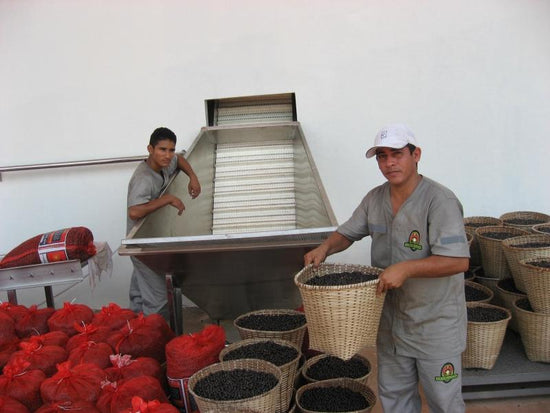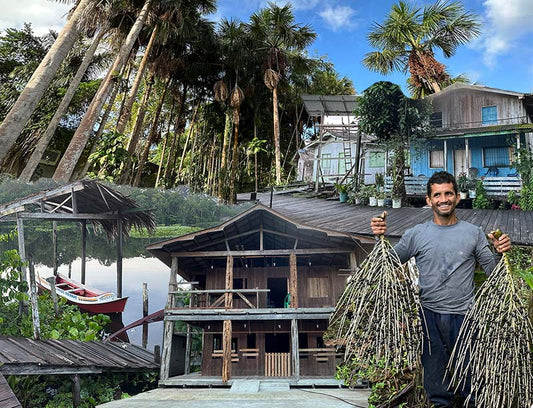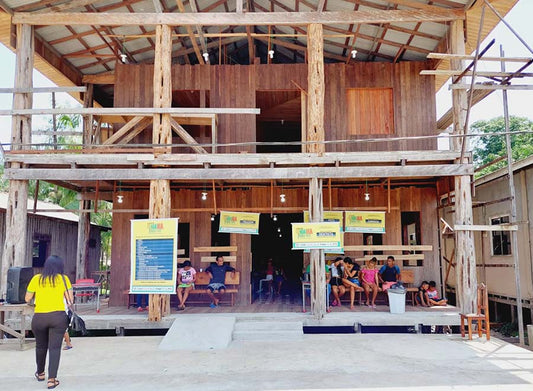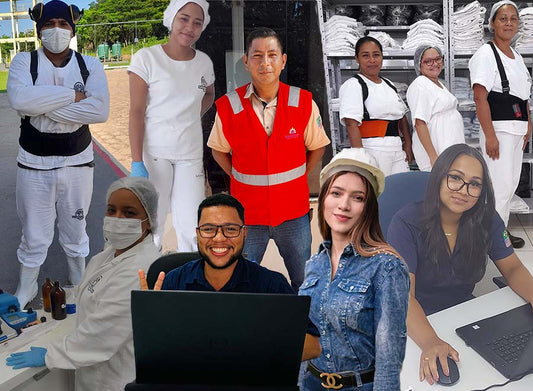We believe in transparency. And we understand how important it is to know the food you and your family consume is of the highest quality, while also being ethically sourced, transported, and processed.
By creating our own supply chain, we can oversee every step of its journey, from the moment our fair trade food is hand-harvested and transported by riverboats, to its inspection (by hand) and environmentally responsible processing. It’s our guarantee to you: From the palm of the tree to the palm of your hand.

FROM A SURF TRIP TO A GLOBAL OPPORTUNITY
The journey began on a surf trip to Brazil to celebrate the new millennium back in 1999. While hanging out with some local surfers we had our first taste of Açaí in a bowl as a frozen, purple fruit slush topped with banana and granola. Amazed by the natural energy and nutritional benefits of this powerful fruit, we were quickly hooked. That first taste of Açaí energized our bodies and stimulated our minds, and we learned that Açaí, “if” managed properly, could help generate sustainable livelihoods in the Amazon where it’s harvested.
That was indeed a big IF. Constructing a certified supply chain from scratch in the middle of the Amazon Rainforest for a “wild harvested” fruit would be no small feat – but we like a challenge here at SAMBAZON. We saw an incredible opportunity that when realized would generate long-term, healthy jobs while simultaneously protecting the biodiversity of the forest – it would “do good” inherently with every berry harvested and create a positive economic chain reaction.

CREATING A SUSTAINABLE SUPPLY CHAIN: “PALM TO PALM”
We soon learned that the Açaí berries are wild-harvested from several hundred-mile radius around the Amazon River estuary and transported by boat in baskets through a series of middlemen, changing hands several times before arriving at huge farmer’s markets in the big cities. Changing hands so many times made origin and quality control practically impossible and regularly created opportunities for middlemen to exploit the small family farmers, essentially forcing them to sell at lower than the cost of living. Although it had never been done before, we realized we could surpass these issues almost completely by cutting out the middlemen and establishing a direct relationship with the small family farmers. With the help of Brazil’s most prominent NGOs and public resources in the region including FASE.org.br, WWF Brazil, and the Federal University of Para (Belem), we developed a sustainable agroforestry program and sponsored the USDA Organic certification of a small group of farmers.
From that pilot program in 2002, we grew the number of participating farmer families from 100 to more than thousands whom we continue to purchase fruit and provide valuable technical assistance, educational opportunities, and social services. Additionally, we assisted and funded EcoCert, a leading Fair-Trade organization, to develop and implement standards with which to certify Açaí “Fair Trade”. This provided us a clear competitive and sustainable advantage while the rest of the industry even today isn't meeting the same standards. To complete our goal of vertical integration, in 2005, we built our first world-class Açaí fruit manufacturing facility on the banks of the Amazon River in Santana, Amapá. Later in 2019, we built our second processing plant in Barcarena, Para. This uniquely allows SAMBAZON the ability to ensure quality control and sustainable certification of origin over every Açai yield we purchase and maintain a direct relationship with the certified Organic and Fair-Trade farmers and their communities.
THE FOUR STEPS OF PALM TO PALM

Harvest
Our Certified Organic and Fair Trade Açaí is hand harvested by local farmers that minimize our impact on the local eco-system.

Selection
Transported by riverboat down the Amazon, our berries are then checked for quality, color, consistency and aroma directly on our dock.

Eco-Processing
Our berries are processed at two of the most advanced, eco-friendly Açaí processing plants in the world.

Serving You
This is where you come in. Enjoy the delicious, nutritious, responsibly sourced berry, and get your purple smile!

OUR BUSINESS MODEL TODAY
SAMBAZON’s Founders envisioned an innovative business model which could use Organic and Fair Trade certified Açai to prove the case for sustainable development in the Amazon Rainforest. They committed to pioneering a vertically integrated supply chain from the Açai “palm” to the “palm” of your hand through thousands of partner cafes, restaurants, and supermarkets across the globe.
We believe in transparency, and we understand how important it is to know that the Açaí bowl or smoothie our consumers enjoy is of the highest quality while also being ethically sourced, transported, and processed. By creating our own responsibly managed supply chain of certified Organic and Fair Trade Açaí, we can establish a direct connection between our farmers and our consumers. We oversee the traceability of the Organic Açaí, from the moment it is wild harvested and transported by riverboats, to its inspection by hand on our Purple dock and through environmentally responsible processing. It’s our guarantee to our consumers: from the Açaí palm trees to the palm of their hands to bring you a purple smile every time you eat Açai.







Comments
(0 Comments)Please note, comments need to be approved before they are published.